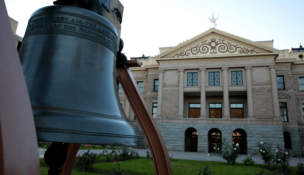Open primaries ballot measure still in limbo
Howard Fischer, Capitol Media Services//August 23, 2024//
Open primaries ballot measure still in limbo
Howard Fischer, Capitol Media Services//August 23, 2024//
The Arizona Supreme Court on Thursday ordered counties to put a measure on the ballot to let voters decide whether they want to scrap partisan primaries.
Whether people will be able to vote for or against it, and whether those votes will count, however, remains a separate legal question.
In a 10-page order, the justices agreed that what is in Proposition 140 would amend multiple sections of the Arizona Constitution about how elections are run in Arizona. And they acknowledged that, generally speaking, voters can’t be asked to make such choices on an all-or-nothing basis.
But Chief Justice Ann Scott Timmer, an appointee of the former Gov. Jan Brewer and writing for the court, said what is in the measure passes legal muster.
“The provisions of the act are topically related, sufficiently interrelated, involve matters that have historically been treated as one subject, and are qualitatively similar in their effect on the law,” she said, even though they seek to alter several constitutional provisions. “Touching on more than one section of the constitution is not necessarily fatal.”
What is less than clear, however, is whether all the challenges to Proposition 140 have been resolved.
On one hand, there is the Thursday order by the high court directing Secretary of State Adrian Fontes to put what is known as the Make Elections Fair Act on the general election ballot “absent any future orders to the contrary.”
But the justices also noted that there has yet to be a final resolution of the question of whether proponents gathered enough valid signatures to qualify for the ballot.
On Wednesday, the justices said Maricopa County Superior Court Judge Frank Moskowitz, an appointee of former Gov. Jan Brewer was wrong in refusing to consider some evidence presented by foes of Proposition 140 about the signature count. And Timmer directed the trial judge to examine the evidence “and determine whether the exhibits prove any duplicate signatures by clear and convincing evidence.”
“The court should then proceed accordingly,” she wrote.
On Thursday, however, Moskowitz said there was no way he could review the approximately 43,000 signatures on petitions that challengers say are duplicates by the time ballots needed to be printed on Friday. So he put off a hearing until Sept. 3.
Andrew Pappas, an attorney for Make Elections Fair, said that’s the end of the challenge.
“The ballot printing deadline moots pending disputes,” he told Capitol Media Services.
There was no immediate response from challengers to what happens now.
But Pappas’ contention about the effect of the deadline may hold no water.
“Although the courts respect the ballot printing deadline and do their best to rule expeditiously to meet the deadline, there is no court rule or law requiring the courts to rule before a ballot printing deadline,” Timmer said in a prepared response to a question about the issue.
And the chief justices said it is now up to Moskowitz to decide the question of whether there are sufficient signatures and issue an order. And, even then, it won’t necessarily be resolved.
“Either party can ask the Supreme Court to review that order,” Timmer said.
There was no immediate response from the Secretary of State’s Office to what happens once the ballots are printed with Proposition 140 on it and a judge subsequently rules it never should have been placed there in the first place.
One option could be for a court to issue an order directing county election officials not to tally any votes for or against it, as it had never been there in the first place.
The pending dispute comes just days after the Secretary of State’s Office finished its review of the approximately 575,000 signatures submitted to send the issue to the ballot. After review, including checking a random sample, it was determined that there are 409,474 valid signatures left.
But the minimum number needed for the proposed constitutional amendment is 383,923. So if the new review disqualifies any more than 20,551 of what remains, the petition drive falls short.
At stake is what could be a sea change in Arizona politics.
Right now candidates seek out the nomination of their own party in a primary that is open only to members of that party. Independents also can vote by choosing a party’s ballot but generally do not participate.
Proponents of Prop 140 said what that means is the nominees seek to appeal only to hard-core party adherents. Then the choice in November is between those picks.
That system has even more pronounced effects in legislative and congressional districts where one party has a huge voter registration advantage over the other. It makes the nominee of the majority party the de facto winner.
Under this system, there would be a single, wide-open primary where all candidates from all parties as well as political independents run against each other. And anyone registered to vote could cast a ballot.
The argument by proponents is that all the candidates would have to appeal to all voters.
But the measure doesn’t stop there.
It would defer to the Legislature to determine how many people advance to the general election. That could simply be the top two, even if both are from the same political party.
What it also would permit, however, is for lawmakers to allow up to five names to go on the ballot. And in that case, it would require a system where voters rank their choices from first to last, with possible multiple stages of eliminating the bottom vote-getter until one candidate has at least 50% of the vote.
Even if the measure is determined qualified for the ballot, there still is another legal issue.
Initiative proponents filed suit after the Legislative Council crafted a summary of the measure that mentioned the option of ranked-choice voting first, even before the mandatory open primary. Maricopa County Superior Court Judge Melissa Julian, an appointee of former Gov. Doug Ducey, ruled that was done on purpose “to dissuade voters from supporting the initiative.”
Lawmakers who make up the Legislative Council now are asking the Supreme Court to overturn Julian’s ruling.
The need for a quick decision on that question is not as acute.
That summary does not go on the ballot but instead into a brochure that is supposed to contain an “impartial” analysis of each measure up for a vote, a brochure mailed to the homes of the state’s more than 4.1 million registered voters. And the deadline for that language is Sept. 6.










































